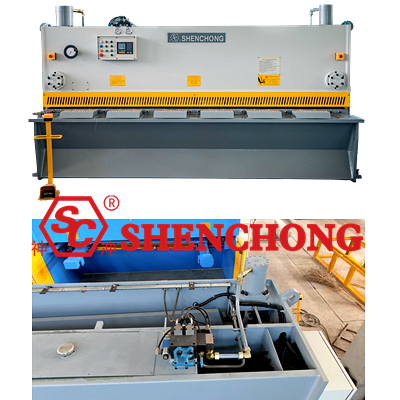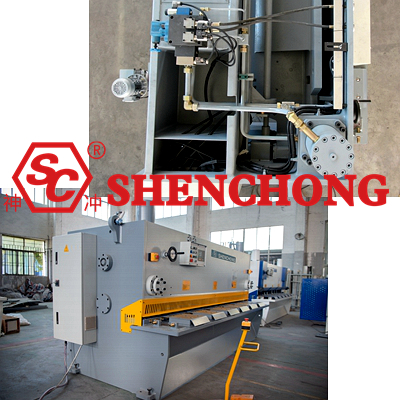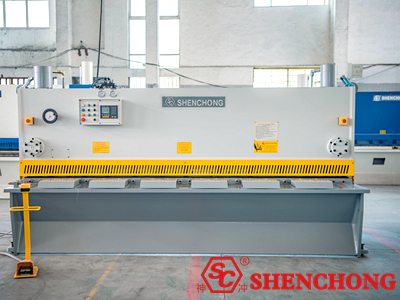
The shearing machine hydraulic oil volum refers to the amount of hydraulic oil required to operate the machine's hydraulic system, which is the main part responsible for providing power and control to various components.
The amount of hydraulic oil required for a shearing machine usually depends on various factors, such as the size of the machine, the type of hydraulic system, and operating conditions. Generally speaking, the hydraulic system of large machines is relatively complex and requires a large amount of hydraulic oil.

Hydraulic oil is a liquid used in hydraulic systems to transmit power and lubricate moving components.
There are usually several types:
The most common type of hydraulic oil is made from petroleum. It has good lubrication performance and is suitable for most hydraulic systems.
It is made from synthetic base oil, such as poly (ethylene glycol) α Olefins (PAO), esters or diesters. Compared to mineral oil, synthetic hydraulic oil has better performance under extreme temperature and high pressure conditions.
It is made from vegetable oil or other biodegradable materials. Usually used in environmentally sensitive areas to prevent soil and water pollution.
Made from water or synthetic esters, with a higher flash point than mineral oil. Fire resistant oil is generally used in situations with fire risks.
High viscosity index (HVI) oil can maintain its viscosity over a wide temperature range. Suitable for environments with significant temperature changes.

Synthetic anti wear hydraulic oil for CNC guillotine shearing machine belongs to the second category of synthetic oil.
Its performance characteristics are as follows:
- Provide anti wear protection for high-pressure systems.
- Recommended for gear pumps, vane pumps, and plunger pumps.
- Contains anti rust, anti oxidation, and anti foaming agents.
- Designed specifically for operation at extreme temperatures.
- Hydrolysis is stable and easy to separate from water.

Antioxidant stability refers to the ability of low resistance to chemical reactions with oxygenated substances when oil temperature increases. Practice has shown that for every 10 ℃ increase in oil temperature, the chemical reaction rate increases by about twice. The hydraulic oil of the shearing machine with good antioxidant stability is not easy to oxidize and deteriorate after long-term use, which can ensure the normal circulation of the hydraulic oil.
The purpose is to reduce mechanical friction and ensure the service life of the hydraulic system of the shearing machine.
The specific adoption depends on the working pressure, working temperature, and movement speed of the executing components of the hydraulic system of the shearing machine. High viscosity is recommended for high-pressure and high-temperature applications, while low viscosity is recommended for high-speed applications.
In order to improve the viscosity index of the oil, high molecular weight polymers such as polymethyl methacrylate and polyisobutylene are often added to the oil. These substances have longer molecular chains and are subjected to significant shear forces when the oil flows through narrow slits in hydraulic components, often causing molecular chain breakage and a decrease in the viscosity temperature characteristics of the oil. The frequent reversing of the directional valve and the throttling of the throttling components during the operation of the shearing machine require hydraulic oil to have strong shear resistance.
Viscosity-temperature property refers to the degree to which the viscosity of an oil changes with temperature, usually represented by a viscosity index.
Anti emulsification refers to the ability of oil to be mixed with water and stirred to become an emulsion, and water can be separated from it. Anti foaming property refers to the ability of oil to be mixed with air and stirred to form an emulsion, and the separation of bubbles from the oil. After mixing with water or air, the volume modulus of oil is reduced, and the compressibility increases. The hydraulic components of the shearing machine act slowly, and are prone to impact and vibration.
Proper maintenance of shearing machine hydraulic oil is crucial for ensuring the lifespan and optimal performance of the hydraulic system.
Proper maintenance of hydraulic oil is crucial for ensuring efficient and safe operation of the machine. This includes regular oil level and quality checks, as well as timely replacement of old or contaminated oil. If the correct amount of hydraulic oil cannot be maintained, it can lead to performance degradation, increased component wear, and even equipment failure.
Regularly check the oil level to ensure that the hydraulic oil is within the recommended range. Low oil level can cause damage to the system, while high oil level can lead to foaming and a decrease in hydraulic system performance.
Regularly check the quality of the hydraulic oil to ensure that it can still function effectively. This can be achieved through oil analysis, which can detect pollutants, water content, and viscosity. Regular monitoring of the condition of hydraulic oil is very important, and conducting oil analysis is to ensure that the hydraulic oil can effectively function.
The signs of needing an oil change include a decrease in viscosity, an increase in operating temperature, foaming, and contamination with debris or water. If these signs appear, the hydraulic oil should be replaced immediately to prevent damage to the shearing machine and ensure optimal performance.
Replace hydraulic oil according to the recommended cycle. If the oil has been contaminated or degraded, it should be replaced in advance. Dirty or contaminated oil can cause damage to the system and reduce machine performance. The frequency of replacement of hydraulic oil for shearing machines depends on various factors, including manufacturer's recommendations, strength and frequency of use, operating conditions, and the quality of the oil itself.
Generally speaking, it is recommended to replace the hydraulic oil at least once a year. If the shear is used with high intensity or frequently operates in harsh environments, it may be necessary to replace the hydraulic oil more frequently.
Use the hydraulic oil type recommended by the shearing machine manufacturer. The use of incorrect hydraulic oil can lead to system damage and decreased machine performance.
Keep the hydraulic system clean and free of debris. Dirt and debris can contaminate the oil and cause system damage.
Regularly check and replace filters to ensure they are not clogged and work effectively. Blocked filters can cause a decrease in pressure and performance.